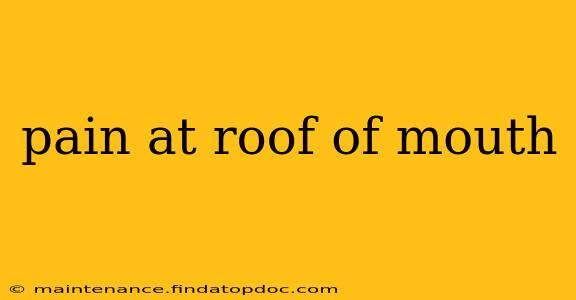Pain at the roof of your mouth, also known as the palate, can be a surprisingly common issue with a wide range of potential causes. From minor irritations to more serious underlying conditions, understanding the source of your pain is crucial for effective treatment. This comprehensive guide will explore the various reasons why you might be experiencing this discomfort, helping you identify potential culprits and seek appropriate care.
What Causes Pain on the Roof of My Mouth?
The causes of palate pain are diverse, ranging from simple to complex. Let's delve into some of the most frequent culprits:
Minor Injuries and Irritations:
- Accidental Burns: Hot food or drinks are the most common cause of palate burns, resulting in temporary pain and sometimes blistering.
- Sharp Foods: Accidentally biting down on a hard piece of food, such as a bone or a hard candy, can cause a painful injury.
- Ill-Fitting Dentures: Dentures that rub or press against the palate can lead to irritation and sores.
- Mouthguards or Retainers: Similar to dentures, poorly fitting mouthguards or retainers can cause friction and discomfort.
- Dry Mouth: A lack of saliva can make the palate more susceptible to irritation and dryness, increasing sensitivity.
Infections and Diseases:
- Oral Thrush (Candidiasis): A fungal infection caused by Candida albicans, often presenting as white patches or a creamy coating on the palate, accompanied by pain and burning.
- Cold Sores (Herpes Simplex Virus): While typically affecting the lips, cold sores can sometimes manifest on the palate, causing painful blisters.
- Canker Sores (Aphthous Ulcers): These small, shallow ulcers can appear anywhere in the mouth, including the palate, causing significant pain.
- Gingivitis and Periodontitis: Although primarily affecting the gums, severe gum disease can sometimes lead to referred pain in the palate.
- Infections of the sinuses: Sinusitis can sometimes cause referred pain to the roof of the mouth.
Other Potential Causes:
- Allergies: Allergic reactions can sometimes manifest as inflammation and irritation in the mouth, including the palate.
- Medications: Certain medications can have side effects that include mouth sores or dryness.
- Autoimmune Diseases: Conditions like lupus can affect the mucous membranes, leading to pain and inflammation.
- Cancer: While rare, some types of mouth cancers can present with persistent pain on the palate. It's crucial to seek medical attention if you experience persistent or worsening pain.
- Nicotine Stomatitis: This condition, primarily affecting smokers, causes inflamed tissue and white patches on the hard palate.
What are the Symptoms of Palate Pain?
Symptoms can vary depending on the underlying cause, but generally include:
- Sharp, burning, or throbbing pain: The intensity and type of pain can vary significantly.
- Redness, swelling, or inflammation: These are common signs of irritation or infection.
- White or yellow patches: These can be indicative of oral thrush or other fungal infections.
- Blisters or sores: These are often associated with injuries, viral infections, or canker sores.
- Difficulty eating or swallowing: Severe pain can make it challenging to consume food or drink.
- Numbness or tingling: Less common but can occur in some cases.
How is Pain on the Roof of My Mouth Treated?
Treatment depends entirely on the underlying cause. For minor injuries, simple home remedies like rinsing with warm salt water or using over-the-counter pain relievers may suffice. However, if the pain is severe, persistent, or accompanied by other symptoms, seeking professional medical attention is crucial. A dentist or doctor can diagnose the cause and recommend appropriate treatment, which may include:
- Antifungal medications: For oral thrush.
- Antiviral medications: For cold sores.
- Steroid creams or mouthwashes: To reduce inflammation and pain.
- Pain relievers: To manage discomfort.
- Prescription mouthwashes: To treat more severe infections.
- Dental adjustments: For ill-fitting dentures or other dental appliances.
How Long Does Pain on the Roof of My Mouth Last?
The duration of palate pain varies greatly depending on the cause. Minor irritations may heal within a few days, while infections or more serious conditions may require weeks or even months of treatment.
When Should I See a Doctor for Roof of Mouth Pain?
You should seek medical attention if:
- The pain is severe or persistent.
- You have other symptoms, such as fever, swelling, or difficulty swallowing.
- The pain doesn't improve after a few days of home treatment.
- You notice any unusual lumps, bumps, or sores.
- You have a weakened immune system.
This information is for general knowledge and does not constitute medical advice. Always consult a healthcare professional for diagnosis and treatment of any medical condition.
